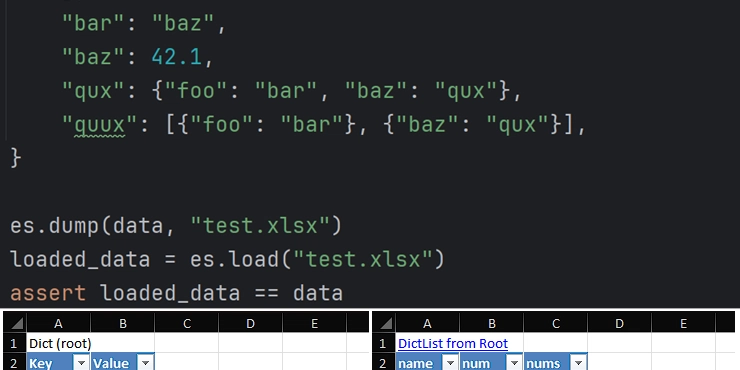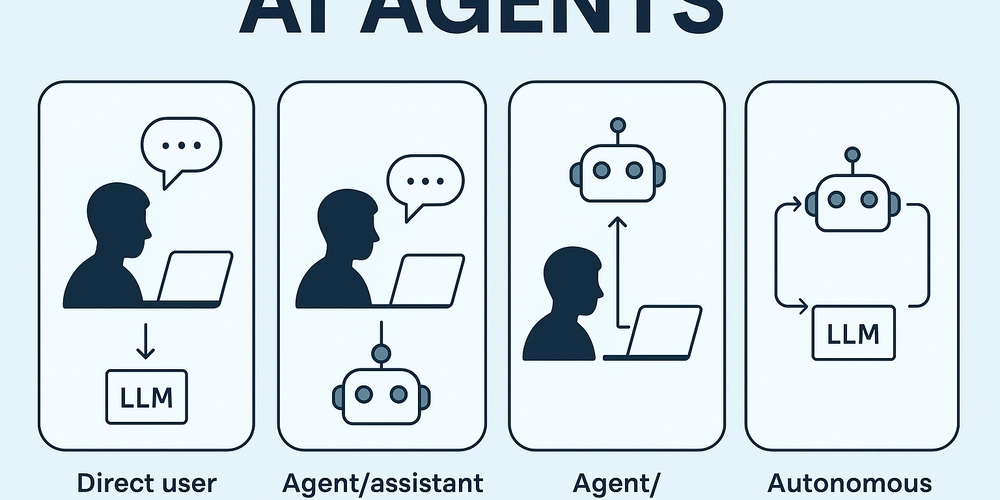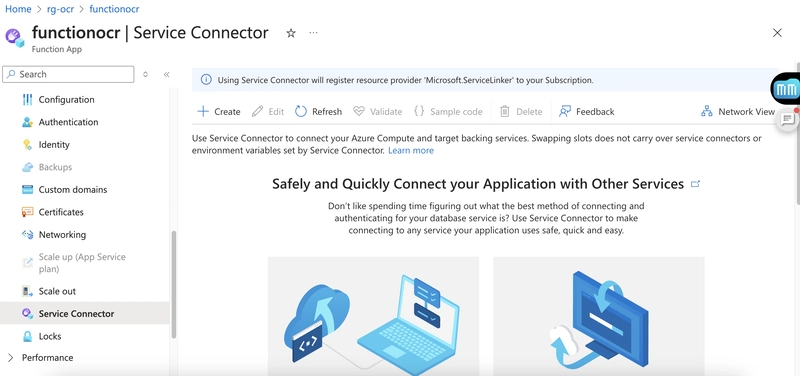Stop flattening your JSON just to export it to Excel
If you've ever needed to share structured Python data (like nested dicts or lists) with non-developers, chances are you've hit this classic wall: Can you export that to Excel? And suddenly, you're fighting two worlds that just weren't made for each other. Most tools expect flat tabular data. Your data isn't flat. So you end up writing brittle custom converters, or flattening everything and losing structure. And don't even get me started on round-tripping that back into Python… I got tired of it. So I built excel-serializer: a Python library that lets you treat Excel like JSON — you can dump() and load() complex, nested structures without losing anything. What it does Serialize any Python data structure (dicts, lists, nested combos) to .xlsx Read it back with full fidelity — like json.load() Structure is preserved across sheets, and stays human-readable/editable Bonus: it also comes with a CLI for easy use in scripts or from the terminal Install it pip install excel-serializer Basic usage (Python) import excel_serializer as es data = { "users": [ {"name": "Alice", "scores": [1, 2, 3]}, {"name": "Bob", "scores": [4, 5, 6]}, ], "meta": {"source": "generated", "count": 2}, } # Write to Excel es.dump(data, "data.xlsx") # Read it back loaded = es.load("data.xlsx") CLI usage Let’s say you have a JSON file like this: { "people": [ {"name": "Alice", "age": 30}, {"name": "Bob", "age": 25} ], "meta": {"created": "2025-03-26"} } You can convert it to Excel with: cat people.json | json2xlsx -o people.xlsx And convert it back: xlsx2json -i people.xlsx > output.json That’s it — no flattening, no config, no lost nesting. Why not use pandas / openpyxl / whatever? Because most of those tools: Expect tabular data (not trees of dicts and lists) Flatten nested structures or choke on them Don’t offer a load()/dump() API with guaranteed round-tripping Require too much boilerplate for simple tasks excel-serializer is opinionated but practical: it chooses a clear way to represent nested data across sheets and makes it dead simple to work with. Try it out

If you've ever needed to share structured Python data (like nested dicts or lists) with non-developers, chances are you've hit this classic wall:
Can you export that to Excel?
And suddenly, you're fighting two worlds that just weren't made for each other.
Most tools expect flat tabular data. Your data isn't flat. So you end up writing brittle custom converters, or flattening everything and losing structure. And don't even get me started on round-tripping that back into Python…
I got tired of it. So I built excel-serializer: a Python library that lets you treat Excel like JSON — you can dump() and load() complex, nested structures without losing anything.
What it does
- Serialize any Python data structure (dicts, lists, nested combos) to .xlsx
- Read it back with full fidelity — like json.load()
- Structure is preserved across sheets, and stays human-readable/editable
- Bonus: it also comes with a CLI for easy use in scripts or from the terminal
Install it
pip install excel-serializer
Basic usage (Python)
import excel_serializer as es
data = {
"users": [
{"name": "Alice", "scores": [1, 2, 3]},
{"name": "Bob", "scores": [4, 5, 6]},
],
"meta": {"source": "generated", "count": 2},
}
# Write to Excel
es.dump(data, "data.xlsx")
# Read it back
loaded = es.load("data.xlsx")
CLI usage
Let’s say you have a JSON file like this:
{
"people": [
{"name": "Alice", "age": 30},
{"name": "Bob", "age": 25}
],
"meta": {"created": "2025-03-26"}
}
You can convert it to Excel with:
cat people.json | json2xlsx -o people.xlsx
And convert it back:
xlsx2json -i people.xlsx > output.json
That’s it — no flattening, no config, no lost nesting.
Why not use pandas / openpyxl / whatever?
Because most of those tools:
- Expect tabular data (not trees of dicts and lists)
- Flatten nested structures or choke on them
- Don’t offer a load()/dump() API with guaranteed round-tripping
- Require too much boilerplate for simple tasks
excel-serializer is opinionated but practical: it chooses a clear way to represent nested data across sheets and makes it dead simple to work with.
Try it out










































































































































































![[The AI Show Episode 142]: ChatGPT’s New Image Generator, Studio Ghibli Craze and Backlash, Gemini 2.5, OpenAI Academy, 4o Updates, Vibe Marketing & xAI Acquires X](https://www.marketingaiinstitute.com/hubfs/ep%20142%20cover.png)



























































































































![[FREE EBOOKS] The Kubernetes Bible, The Ultimate Linux Shell Scripting Guide & Four More Best Selling Titles](https://www.javacodegeeks.com/wp-content/uploads/2012/12/jcg-logo.jpg)



![From drop-out to software architect with Jason Lengstorf [Podcast #167]](https://cdn.hashnode.com/res/hashnode/image/upload/v1743796461357/f3d19cd7-e6f5-4d7c-8bfc-eb974bc8da68.png?#)






































































































.png?#)




.jpg?#)
































_Christophe_Coat_Alamy.jpg?#)







































































































![Rapidus in Talks With Apple as It Accelerates Toward 2nm Chip Production [Report]](https://www.iclarified.com/images/news/96937/96937/96937-640.jpg)









































































































































